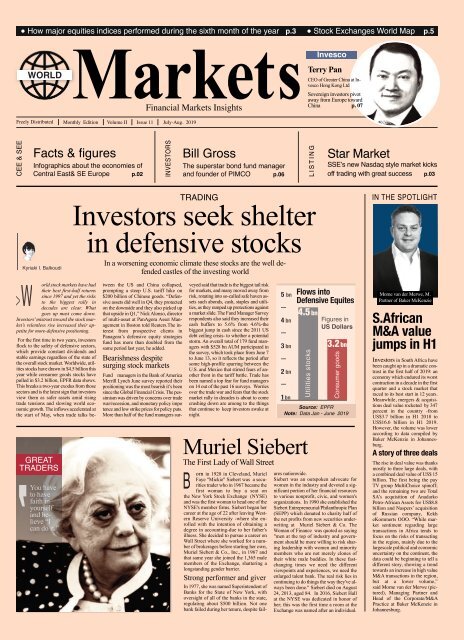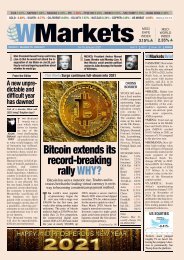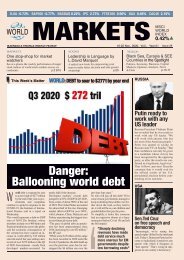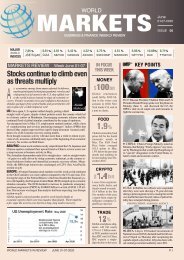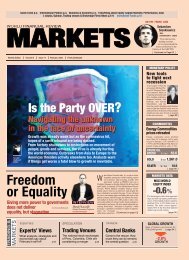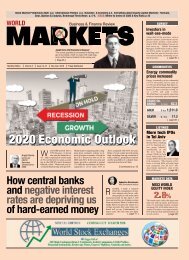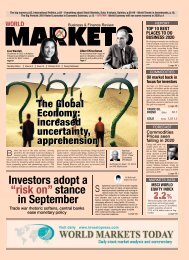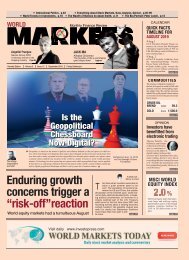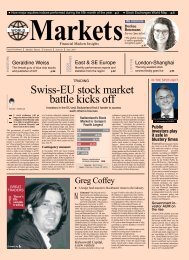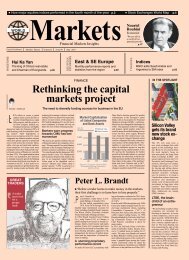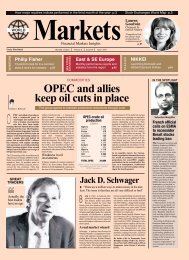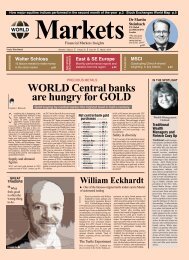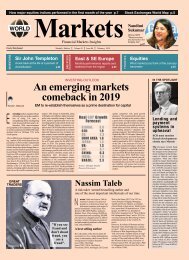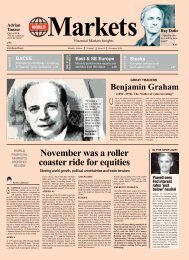Create successful ePaper yourself
Turn your PDF publications into a flip-book with our unique Google optimized e-Paper software.
WM <strong>11</strong>AAA_Layout 1 8/3/19 3:05 PM Page 25<br />
● How major equities indices performed during the sixth month of the year p.3 ● Stock Exchanges World Map p.5<br />
<strong>WORLD</strong><br />
Markets<br />
Financial Markets Insights<br />
Invesco<br />
Terry Pan<br />
CEO of Greater China at Invesco<br />
Hong Kong Ltd<br />
Sovereign investors pivot<br />
away from Europe toward<br />
China p. 07<br />
Freely Distributed<br />
⎥ Monthly Edition ⎥ Volume II ⎥ Issue <strong>11</strong> ⎥ July-Aug. 2019<br />
CEE & SEE<br />
Facts & figures<br />
Infographics about the economies of<br />
Central East& SE Europe p.02<br />
INVESTORS<br />
Bill Gross<br />
The superstar bond fund manager<br />
and founder of PIMCO p.06<br />
L I S T I N G<br />
Star Market<br />
SSE’s new Nasdaq style market kicks<br />
off trading with great success p.03<br />
TRADING<br />
Investors seek shelter<br />
IN THE SPOTLIGHT<br />
in defensive stocks<br />
Kyriaki I. Balkoudi<br />
orld stock markets have had<br />
their best first-half returns<br />
since 1997 and yet the risks<br />
to the biggest rally in<br />
decades are clear. What<br />
goes up must come down.<br />
Investors' mistrust toward the stock market’s<br />
relentless rise increased their appetite<br />
for more-defensive positioning.<br />
GREAT<br />
TRADERS<br />
In a worsening economic climate these stocks are the well defended<br />
castles of the investing world<br />
For the first time in two years, investors<br />
flock to the safety of defensive sectors,<br />
which provide constant dividends and<br />
stable earnings regardless of the state of<br />
the overall stock market. Worldwide, utilities<br />
stocks have drawn in $4.5 billion this<br />
year while consumer goods stocks have<br />
pulled in $3.2 billion, EPFR data shows.<br />
This breaks a two-year exodus from those<br />
sectors and is the latest sign that investors<br />
view them as safer assets amid rising<br />
trade tensions and slowing world economic<br />
growth. The inflows accelerated at<br />
the start of May, when trade talks between<br />
the US and China collapsed,<br />
prompting a steep U.S. tariff hike on<br />
$200 billion of Chinese goods. “Defensive<br />
assets did well in Q4, they protected<br />
on the downside and they also picked up<br />
that upside in Q1,” Nick Alonso, director<br />
of multi-asset at PanAgora Asset Management<br />
in Boston told Reuters.The interest<br />
from prospective clients in<br />
Panagora’s defensive equity strategies<br />
fund has more than doubled from the<br />
same period last year, he added.<br />
Bearishness despite<br />
surging stock markets<br />
Muriel Siebert<br />
The First Lady of Wall Street<br />
B<br />
Fund managers in the Bank of America<br />
Merrill Lynch June survey reported their<br />
positioning was the most bearish it’s been<br />
since the Global Financial Crisis. The pessimism<br />
was driven by concerns over trade<br />
war/recession, and monetary policy impo<br />
tence and low strike prices for policy puts.<br />
More than half of the fund managers surveyed<br />
said that trade is the biggest tail risk<br />
for markets, and many moved away from<br />
risk, rotating into so-called safe haven assets<br />
such abonds, cash, staples and utilities,<br />
as they ramped up protections against<br />
a market slide. The Fund Manager Survey<br />
respondents also said they increased their<br />
cash buffers to 5.6% from 4.6%-the<br />
biggest jump in cash since the 20<strong>11</strong> US<br />
debt ceiling crisis- to whether a potential<br />
storm. An overall total of 179 fund managers<br />
with $528 bn AUM participated in<br />
the survey, which took place from June 7<br />
to June 13, so it reflects the period after<br />
some high-profile sparring between the<br />
U.S. and Mexico that stirred fears of another<br />
front in the tariff battle. Trade has<br />
been named a top fear for fund managers<br />
on 14 out of the past 16 surveys. Worries<br />
over the trade war and fears that the stock<br />
market rally in decades is about to come<br />
crashing down are among to the things<br />
that continue to keep investors awake at<br />
night.<br />
orn in 1928 in Cleveland, Muriel<br />
Faye "Mickie" Siebert was a securities<br />
trader who in 1967 became the<br />
first woman to buy a seat on<br />
the New York Stock Exchange (NYSE)<br />
and was the first woman to head one of the<br />
NYSE's member firms. Siebert began her<br />
career at the age of 22 after leaving Western<br />
Reserve University -where she enrolled<br />
with the intention of obtaining a<br />
degree in accounting-due to her father's<br />
illness. She decided to pursue a career on<br />
Wall Street where she worked for a number<br />
of brokerages before starting her own,<br />
Muriel Siebert & Co., Inc., in 1967 and<br />
that same year she joined the 1,365 male<br />
members of the Exchange, shattering a<br />
longstanding gender barrier.<br />
Strong performer and giver<br />
5 bn<br />
4 bn<br />
3 bn<br />
2 bn<br />
1bn<br />
Flows into<br />
Defensive Equites<br />
4.5 bn<br />
Utilities stocks<br />
Figures in<br />
US Dollars<br />
3.2 bn<br />
Consumer goods<br />
Source: EPFR<br />
Note: Data Jan - June 2019<br />
In 1977, she was named Superintendent of<br />
Banks for the State of New York, with<br />
oversight of all of the banks in the state,<br />
regulating about $500 billion. Not one<br />
bank failed during her tenure, despite failures<br />
nationwide.<br />
Siebert was an outspoken advocate for<br />
women in the industry and devoted a significant<br />
portion of her financial resources<br />
to various nonprofit, civic, and women's<br />
organizations. In 1990 she established the<br />
Siebert Entrepreneurial/Philanthropic Plan<br />
(SEPP) which donated to charity half of<br />
the net profits from new securities underwriting<br />
at Muriel Siebert & Co. The<br />
Woman of Finance was quoted as saying<br />
"men at the top of industry and government<br />
should be more willing to risk sharing<br />
leadership with women and minority<br />
members who are not merely clones of<br />
their white male buddies. In these fastchanging<br />
times we need the different<br />
viewpoints and experiences, we need the<br />
enlarged talent bank. The real risk lies in<br />
continuing to do things the way they've always<br />
been done." Siebert died on August<br />
24, 2013, aged 84. In 2016, Siebert Hall<br />
at the NYSE was dedicated in honor of<br />
her; this was the first time a room at the<br />
Exchange was named after an individual.<br />
Morne van der Merwe, M.<br />
Partner of Baker McKenzie<br />
S.African<br />
M&A value<br />
jumps in H1<br />
Investors in South Africa have<br />
been caught up in a dramatic contrast<br />
in the first half of 2019: an<br />
economy which endured its worst<br />
contraction in a decade in the first<br />
quarter and a stock market that<br />
raced to its best start in 12 years.<br />
Meanwhile, mergers & acquisitions<br />
deal value rocketed by 347<br />
percent in the country -from<br />
US$3.7 billion in H1 2018 to<br />
US$16.6 billion in H1 2019.<br />
However, the volume was lower<br />
according to data compiled by<br />
Baker McKenzie in Johannesburg.<br />
A story of three deals<br />
The rise in deal value was thanks<br />
mostly to three large deals, with<br />
a combined deal value of US$ 15<br />
billion. The first being the pay<br />
TV group MultiChoice spinoff;<br />
and the remaining two are Total<br />
SA’s acquisition of Anadarko<br />
Petro-African Assets for US$8.8<br />
billion and Naspers’ acquisition<br />
of Russian company, Kekh<br />
eKommerts OOO. “While market<br />
sentiment regarding large<br />
transactions in Africa tends to<br />
focus on the risks of transacting<br />
in the region, mainly due to the<br />
largescale political and economic<br />
uncertainty on the continent, the<br />
data could be beginning to tell a<br />
different story, showing a trend<br />
towards an increase in high value<br />
M&A transactions in the region,<br />
but at a lower volume,”<br />
said Morne van der Merwe (pictured),<br />
Managing Partner and<br />
Head of the Corporate/M&A<br />
Practice at Baker McKenzie in<br />
Johannesburg.
WM <strong>11</strong>AAA_Layout 1 8/3/19 3:05 PM Page 26<br />
2 INSIDE THE <strong>MARKETS</strong> Issue <strong>11</strong> ⎥ July-Aug. 2019<br />
World<br />
Markets<br />
In Brief<br />
1<br />
<strong>WORLD</strong><br />
Some $13 trillion in sovereign<br />
debt bears a negative yield. Deutsche<br />
Bank Securities’s Chief Economist<br />
Torsten Sløk notes that 25%, or one<br />
out of every four bonds in the world,<br />
now yields negative rates. Graph:<br />
Deutsche Bank, Bloomberg<br />
2<br />
AFRICA<br />
Investors and dealing members will begin<br />
to pay value-added tax for transactions<br />
carried out on the Nigerian Stock Exchange<br />
(NGSE) from July 25. This is due<br />
to the expiration of the Value-Added Tax<br />
(Exemption of Commissions on Stock<br />
Exchange Transactions) Order of 2014.<br />
3<br />
AMERICA<br />
Virgin Galactic, Richard Branson’s<br />
space-tourism venture, plans a stock<br />
market listing by the end of the year.<br />
The company will list its shares as<br />
part of a merger with Social Capital<br />
Hedosophia Holdings which will<br />
take a 49% stake in Virgin Galactic.<br />
INVESTMENT TRENDS<br />
German companies<br />
to invest in Russia<br />
Top German companies working in Russia plan to invest at least<br />
€395mn into Russia over the next 12 months, according to the<br />
Russian-German Chamber of Commerce, as cited by Tass on June<br />
27.Germany has ten times more companies registered in Russia<br />
than the other EU nations. At the same time investments by German<br />
businesses into Russia reached their highest level in the last<br />
decade, topping €3bn, the RGCC reported in April.<br />
UAE opens to<br />
unrestricted FDI<br />
On 2nd July 2019<br />
the Federal United<br />
Arab Emirates (UAE)<br />
Cabinet announced its<br />
decision to lift a<br />
decades-old cap on<br />
foreign ownership<br />
and and allow full<br />
foreign control of<br />
business ventures. "In<br />
a cabinet meeting I<br />
chaired in Abu Dhabi, we approved 100 percent foreign ownership<br />
in 122 economic activities," UAE vice president and prime minister<br />
Sheikh Mohammed bin Rashed Al-Maktoum (pictured) said on<br />
Twitter. The affected sectors comprise: transport and storage; agriculture;<br />
space; manufacturing; renewable energy; hospitality and<br />
food services; information and communication; professional, scientific<br />
and technical activities; administrative and support services;<br />
educational activities; healthcare; art and entertainment; and construction.<br />
The UAE is already the Arab world's top recipient of foreign<br />
direct investment, attracting more than $<strong>11</strong> billion last year.<br />
Few investors held<br />
their nerve during<br />
Q4 2018<br />
New research shows that only a fifth of investors said they stuck<br />
with their investment plans during the final three months of 2018,<br />
when global stocks suffered their worst quarterly fall in seven<br />
years. The study found that 70% of investors made some changes<br />
to their portfolios in direct response to the instability. These included,<br />
37% who moved into lower-risk investments and 35%<br />
who opted for higher-risk options. Only 21% of people kept their<br />
investments the same. The findings were part of Schroders Global<br />
Investor Study 2019 which measured the views of 25,743 investors<br />
in 32 countries throughout the world,<br />
Europe's alts assets<br />
market is thriving<br />
Despite a general air of<br />
gloom descending on<br />
Europe, the continent's<br />
alternative assets industry<br />
is in rude health,<br />
according to a new<br />
report from research<br />
house, Preqin. The report<br />
titled Alternatives<br />
in Europe finds that<br />
2018 has seen record<br />
activity across most alternative asset classes, and Europe-based alternative<br />
asset fund managers hold €1.62tn in assets under management<br />
(AUM) as of the end of June 2018 – up almost €300bn in just<br />
three years. Mark O’Hare, Preqin CEO (pictured), says in the report<br />
that “economic growth is not the same thing as activity and opportunities<br />
in alternative assets”. Preqin forecasts a near-doubling of<br />
global alternatives AUM over the next four years, and all the evidence<br />
suggests that the European market will play a huge part in<br />
driving this growth.<br />
Below you can find interesting facts and<br />
figures about the economies of Central and<br />
Eastern Europe (CEE) and South Eastern<br />
Europe (SEE) that give you a perspective<br />
on the region. World Markets undertakesall<br />
the reasonanble efforts to ensure that<br />
data included in this column was correct<br />
at the time of publication.<br />
SEE<br />
Romania's iHunt valued at<br />
2.59 mln in share listing<br />
S<br />
hares of iHunt, a Romanian direct importer<br />
of mobile phones and accessories<br />
from China, started trading on the alternative<br />
trading system (AeRO) of<br />
the Bucharest Stock Exchange (BVB) on July 9,<br />
following the company’s IPO which was intermediated<br />
by Goldring, as Authorized Consultant.<br />
iHunt (ticker symbol HUNT) is the first online<br />
retailer and mobile phone producer listed on the<br />
BVB. Almost 1.7 million shares were traded on<br />
the first day, representing over 12% of all the<br />
company's shares. According to the BVB, 516<br />
transactions were made, with a total value of<br />
around RON 1.5 million. The main shareholder<br />
The first online and mobile phone retailer listed on the<br />
AeRO market of the Bucharest Stock Exchange<br />
of the iHunt is Cezar Catalin Stroe (99.5%), a<br />
young Romanian entrepreneur while Liviu Corneliu<br />
Stroe holds 0.5%. According to the memorandum<br />
of the listing, iHunt intends to grant<br />
dividends to shareholders, striking a balance between<br />
investment policy and dividend policy,<br />
while taking into account investors' expectations.<br />
iHunt is also one of the 15 finalists of the third<br />
edition of the Made in Romania project, organised<br />
by the Romanian capital market operator.<br />
The initiative which started two years ago aims<br />
to promote Romanian entrepreneurship, improve<br />
transparency, visibility and ensure the further development<br />
of the companies.<br />
PHOTO: Cezar Catalin Stroe main shareholder of iHunt, a Romanian direct importer of mobile phones and accessories from China<br />
★<br />
SERBIA<br />
1 bn<br />
BULGARIA<br />
7.3%<br />
MONTENEG<br />
3%<br />
ALBANIA<br />
1%<br />
ROMANIA<br />
7.1%<br />
★<br />
CROATIA<br />
10<br />
BALTICS<br />
0.8pt<br />
POLAND<br />
5.1%<br />
LATVIA<br />
3.5%<br />
HUNGARY<br />
7.8%<br />
Central East & South East Europe Markets<br />
Infographics in SEE & CE Europe<br />
SEE markets facts and figures<br />
On June 19 Serbia issued a 1 bln euro 10-year eurobond on the<br />
London Stock Exchange with interest rate at 1.6%.<br />
Exports of goods from Bulgaria to the EU and to third countries increased<br />
in May by 7.3% y-o-y according to the NSI.<br />
The economy of Montenegro advanced 3% y-o-y in the first quarter<br />
of 2019, easing from a 4.8 % growth in the previous period.<br />
On July 3 the Supervisory Council of the Bank of Albania decided<br />
to maintain the base interest rate unchanged at 1.00%.<br />
The media and entertainment industry in Romania will reach in<br />
2019 the $3bn US threshold, up 7.1% compared to 2018 according<br />
to the PwC GEMO report 2019-2023.<br />
CEE markets facts and figures<br />
Ten companies and consortia have made bids to build part of a 297<br />
million euro Croatian rail project , Croatian Railways said on July 22.<br />
Lithuanian industrial production grew 1.6% y/y in June.The reading<br />
marks a pick up of 0.8pp in the annual growth rate.<br />
Seasonally adjusted industrial production in Poland increased by<br />
5.1% y-o-y in May (after an increase of 6.6% y-o-y in the previous<br />
month), Eurostat reported.<br />
In May 2019 foreign trade turnover of Latvia was 3.5 % larger than a<br />
year ago, amounting to 2.5 bn euro, the Central Statistical Bureau said.<br />
Hungary’s chemicals industry grew 7.8% last year, outpacing the average<br />
growth of the sector in the EU according to the Hungarian Chemical<br />
Industry Association<br />
IN FOCUS<br />
Bond issues<br />
pick up<br />
Eastern Europe had a good month<br />
with issues of $5.1bn in June. In Central<br />
Europe the amount of bond issues<br />
was also up to $29.1bn in the first six<br />
months of this year against the total of<br />
$25.9bn that was issued in the same<br />
period a year earlier.<br />
Issues are going well thanks to the<br />
very strong first quarter when well<br />
over half of all the bonds issued this<br />
year were issued – collectively two<br />
thirds (64%) of all the bonds issued<br />
this year were issued in the first quarter.<br />
In Eastern Europe the market is up<br />
marginally on last year with $18.1bn<br />
issues in H1 2019 respectively, up<br />
from the $17bn issued last year.<br />
Amongst the issuers in Central Europe,<br />
there was heavy sovereign activity<br />
where the governments of<br />
Croatia, Serbia and Lithuania all issued<br />
bonds (€1.5bn, €1bn, €1.5bn<br />
respectively) with yields of between<br />
1.125% and 1.65%.<br />
Latvia had already issued its €1bn<br />
sovereign bond in May and Slovakia<br />
did the same in April to complete the<br />
set. June, July and August are normally<br />
dead months for Eastern Europe’s<br />
bond market and issues last<br />
year were next to nothing.<br />
However, the outlook for this and<br />
next year is better. According to Raiffeisen<br />
Research, Central, Eastern and<br />
Southeast European sovereigns will<br />
return to debt markets on large scale<br />
in 2020. In 2020, “the maturing debt<br />
will jump to €18.7bn and the redemption<br />
schedule will remain relatively<br />
tough with overall €17.6bn in<br />
2021 too...Overall in CEE the larger<br />
redemptions in 2020 speak in favour<br />
of issuing more new Eurobonds to<br />
help sovereigns rollover the expiring<br />
debt,” the report says.
I<br />
WM <strong>11</strong>AAA_Layout 1 8/3/19 3:06 PM Page 29<br />
Issue <strong>11</strong> ⎥ July-Aug. 2019<br />
Markets<br />
summary,<br />
monthly change<br />
<strong>WORLD</strong> STOCK EXCHANGES<br />
Almost all 24 major stock indices<br />
closed in the green in June 2019<br />
3<br />
7.42%<br />
NASDAQ<br />
(USA)<br />
6.89%<br />
S&P 500<br />
(USA)<br />
7.19%<br />
DJIA<br />
(USA)<br />
4.28%<br />
STOXX 600<br />
(EUROPE)<br />
3.69%<br />
FTSE 100<br />
(UK)<br />
6.36%<br />
CAC40<br />
(FRANCE)<br />
5.73%<br />
DAX<br />
(GERMANY)<br />
3.93%<br />
SMI<br />
2.77%<br />
SHANGHAI C.<br />
(SWITZERLAND) (CHINA)<br />
3.28%<br />
NIKKEI 225<br />
(JAPAN)<br />
4.35%<br />
KOSPI<br />
(S.KOREA)<br />
6.54%<br />
STI<br />
(SINGAPORE)<br />
2.41%<br />
JSX COMP<br />
(INDONESIA)<br />
LISTING<br />
SSE's new<br />
Nasdaq-style<br />
STAR Market<br />
T<br />
8.10%<br />
HANG SENG<br />
(HONG KONG)<br />
2.21%<br />
TWI<br />
(TAIWAN)<br />
he STAR market, Shanghai Stock Exchange's<br />
(SSE) Nasdaq-style technology<br />
board, started trading on Monday (July 22)<br />
with shares of the first batch of 25 companies<br />
skyrocketing on their debut day. STAR-listed<br />
companies -ranging from chip-makers to biotech<br />
and AI firms- posted average gains of 140%, raising<br />
more than 37 billion yuan ($5.4 billion) from<br />
their initial public offerings. Some shares of the<br />
25 Star Market debutants climbed as much as<br />
520% and more than doubled the board's combined<br />
market capitalisation. Only three of the 25<br />
stocks didn’t hit a circuit breaker-designed to<br />
calm frenzied buying- causing trading to be automatically<br />
suspended for 10 minutes, with 14<br />
being paused due to a rise of 30 per cent from<br />
their opening price and eight being paused after<br />
falling 30 per cent.<br />
Lenient rules<br />
Unveiled last November by Chinese President Xi<br />
Jinping and officially launched on June 13, the<br />
STAR-the Science and Technology Innovation<br />
Board- is part of China's bid for becoming the<br />
dominant player in the technologies of the future.<br />
The country's top securities regulator says the new<br />
Shanghai market will welcome innovative companies<br />
in industries with major growth potential,<br />
such as next-generation information technology,<br />
smart manufacturing, aerospace, new materials,<br />
renewable energy and biotech. In a first for China,<br />
the STAR market allows the listing of unprofitable<br />
companies. It also allows listings of companies<br />
with dual-class shares or weighted voting rights<br />
and waives the cap on IPO prices. The new market<br />
has no daily trading limits in place for the first five<br />
days of trading but companies will be subject to a<br />
20 per cent limit from the sixth day of trade. More<br />
than 100 companies have applied to raise funds on<br />
the new market according to the Shanghai stock<br />
exchange.<br />
GRAPH of the Month<br />
Index Returns for<br />
June 2019 (%)<br />
Source:<br />
MSCI, FactSet, J.P. Morgan Economic<br />
Research, J.P. Morgan, Asset Management.<br />
INDEX GBP USD JPY EUR LOC<br />
Equities (MSCI)<br />
MSCI World 5.6 6.6 5.8 4.3 5.9<br />
MSCI USA 6.0 7.0 6.2 4.7 7.0<br />
MSCI Europe 6.4 7.4 6.6 5.1 4.9<br />
MSCI UK 4.0 5.0 4.2 2.7 4.0<br />
MSCI Japan 2.8 3.8 3.0 1.5 3.0<br />
MSCI AC Asia 5.6 6.7 5.8 4.4 5.4<br />
MSCI EM L.Am. 5.2 6.2 5.4 3.9 3.8<br />
MSCI EM 5.3 6.3 5.5 4.0 4.7<br />
(Data as of 30 June 2019)<br />
-0.80%<br />
SENSEX<br />
(INDIA)<br />
4.06%<br />
BOVESPA<br />
(BRAZIL)<br />
0.96%<br />
IPC ASI<br />
(MEXICO)<br />
Brokers work on the Buenos Aires Stock Exchange floor in Argentina<br />
Risk seeking investors<br />
back to the markets<br />
>R<br />
ebounding from a rout in May,<br />
world equity markets rallied<br />
sharply in June. Investor sentiment<br />
improved as major central<br />
banks confronted by weaker economic<br />
data made a dovish turn,<br />
making it clear looser monetary policy is on the horizon.<br />
Diminishing trade tensions also contributed to<br />
market gains as G20 leaders met in Japan, where US<br />
and China agreed to resume trade talks, easing a<br />
long row that has contributed to a global economic<br />
slowdown. Meanwhile the US promised to temporarily<br />
halt a new 20% tariff on US$300bn worth<br />
of Chinese imports, US President Donald Trump allowed<br />
Chinese telecoms equipment maker Huawei<br />
to once again purchase<br />
US products and China agreed to increase its purchase<br />
of US food and agricultural products.<br />
▪ AMERICAS<br />
At its June meeting, Federal Reserve officials<br />
elected to hold interest rates steady. Policymakers<br />
removed the wording about being“patient” in determining<br />
future adjustments in the interest rate leading<br />
many investors to expect a full 50‐basis‐point<br />
(0.50%) rate cut as early as July. The enthusiasm<br />
helped ignite June's rally, with the S&P 500 generating<br />
its best monthly gain since January. Returns<br />
were also supported by another soft inflation reading<br />
which could make a cut in interest rates more likely.<br />
In Latin America, markets got a boost from easing<br />
U.S.‐Mexico trade tensions after Mexico reached a<br />
last-minute deal with the US to curb migration. Argentine<br />
stocks surged more than 26%, as MSCI<br />
added Argentina securities to its emerging markets<br />
index, opening the potential for billions of dollars of<br />
investor inflows.<br />
▪ EUROPE<br />
Despite continuing political turmoil across the continent,<br />
European markets fared very well, benefiting<br />
from comments by Mario Draghi, President of the<br />
European Central Bank (ECB). The ECB's key policy<br />
rate stood at –0.4% in June. Draghi stated further<br />
23.<strong>11</strong>%<br />
MERVAL<br />
(ARGENTINA)<br />
6.37%<br />
MOEX<br />
(RUSSIA)<br />
2.39%<br />
EGX30<br />
(EGYPT)<br />
Hopes for a positive breakthrough in the ongoing US-China<br />
trade negotiations and further monetary policy easing by<br />
major central banks boosted risk appetite in June<br />
Kyriaki I. Balkoudi Editor-in-chief<br />
policy space existed to cut interest rates “if adverse<br />
contingencies were to materialise”. The ECB chief<br />
also left the door open to further prospects for quantitative<br />
easing and investors cheered the likely extension<br />
of loose monetary policy. In the<br />
UK, markets recovered most of the ground lost during<br />
May. The Bank of England voted to keep interest<br />
rates on hold at 0.75% but warned that it expects<br />
economic growth to be flat<br />
▪ ASIA/PACIFIC<br />
Asian equity markets staged a recovery in June on<br />
expectations that the U.S. and China would reach a<br />
détente in their trade dispute. Singapore and Thailand<br />
led the gains in the region. The Bank of Japan<br />
left interest rates unchanged and joined the Fed and<br />
ECB in signaling its readiness to increase stimulus<br />
if needed. Hong Kong equities rose despite massive<br />
protests over a bill that would allow for the extradition<br />
of Hong Kong citizens to mainland China. In<br />
Australia, the central bank cut its overnight lending<br />
rate to a record low of 1.25%<br />
▪ EMERGING <strong>MARKETS</strong><br />
Emerging markets stocks also rallied in June as trade<br />
tension between the US and China eased and the<br />
dovish stance by central banks worldwide reassured<br />
investors that capital would continue to flow into the<br />
developing world. The MSCI EM Europe, Middle<br />
East and Africa Index rose 5.90%, led by Russia,<br />
where stocks were buoyed by a late‐month spike in<br />
oil prices after shipping disruptions in the Gulf of<br />
Oman. U.S. dollar-denominated Chinese stocks and<br />
yuan‐denominated A shares advanced while India<br />
fell modestly on higher energy prices. South Africa<br />
equity markets followed world markets higher.<br />
Equity markets recovered strongly in June on hopes<br />
of easier monetary policy and the lessening U.S.-<br />
China trade tensions. The markets' strong performance<br />
has made it a good quarter but wait to see<br />
whether growth reaccelerates or slows further.<br />
Looking forward to the next critical economic data.<br />
2.15%<br />
TSX COMP<br />
(CANADA)<br />
3.47%<br />
ASX 200<br />
(AUSTRALIA)<br />
EXPERTS TALK<br />
4.59%<br />
FTSE/JSE ASI<br />
(S.AFRICA)<br />
Looking for<br />
anti-bubble<br />
investments<br />
As market volatily remains<br />
the search for safe assets continues<br />
B<br />
ubbles and subsequent busts occur in<br />
the investment world from time to<br />
time. When the dot-com bubble<br />
burst in 2000 it sent significant numbers of<br />
businesses to the wall . Fast forward 19 years<br />
and, following a similar “app” boom, investment<br />
banks are bringing forward IPOs as they<br />
foresee volatile market conditions arriving<br />
later in the year. But there stocks which could<br />
be termed “anti bubble” and places where investors'<br />
money is more safe as the U.S.-<br />
China trade dispute drags on.<br />
Rob Arnott<br />
RAFI founder.<br />
In its latest client note titled<br />
“Bubble, Bubble, Toil and<br />
Trouble”, Research Affiliates<br />
(RAFI) says that Tesla,<br />
Bitcoin, and some US tech<br />
stocks are valued by the<br />
market way above their fundamentals.<br />
According to the note: “These assets<br />
are well avoided by investors, as are US market<br />
cap–weighted indices, which have an historically<br />
large concentration of pricey and overvalued<br />
large-cap tech stocks. Investors who<br />
take advantage of today’s anti-bubbles have the<br />
opportunity to add value by investing in the<br />
emerging markets, particularly state-owned enterprises<br />
(SOEs), and by averaging into the UK<br />
stock market where stocks are feeling the pressure<br />
of Brexit-related uncertainty. Value-oriented<br />
smart beta strategies in both the<br />
developed and emerging markets offer investors<br />
promising investing opportunities outside<br />
the many bubbles in today’s global<br />
markets.”<br />
Andrew Gillan<br />
at Janus Henderson Investors.<br />
As the trade fight between<br />
Washington and Beijing<br />
goes on and on with both<br />
economic powerhouses<br />
having placed tariffs on<br />
each other’s goods, investors<br />
have been seeking for places<br />
not impacted by duties. According to Andrew<br />
Gillan, head of Asia ex-Japan equities at Janus<br />
Henderson, investors should look at Southeast<br />
Asia, where some countries have been a beneficiary<br />
of the dispute as trade flows divert.<br />
The Philippines and Indonesia have been “a<br />
little out of favour but still growing at very<br />
high rates,” he told CNBC. “We like those<br />
markets,” he continued. “We’ve maintained<br />
positions in the Philippines over the last few<br />
years but ... we’re happy to be significantly<br />
overweight.” Gillan also singled out the financial<br />
sector in Indonesia, where the stocks<br />
have “over the last decade delivered really<br />
long-term structural growth and maintained ...<br />
high return on equity.” The PSE composite<br />
index in the Philippines and Jakarta composite<br />
in Indonesia have risen more than 10% and<br />
3% for the year, respectively.
WM <strong>11</strong>AAA_Layout 1 8/3/19 3:06 PM Page 30<br />
4<br />
TRADING VENUES NEWS<br />
Issue <strong>11</strong> ⎥ July-Aug. 2019<br />
⎥ World Markets Insider<br />
MSCI adds Kuwait<br />
in its EM index<br />
Stay ahead of the market with the most<br />
interesting developments from world<br />
stock exchanges. From performance reports<br />
to changes in trading structures,<br />
from c-level executive positions to new<br />
exchanges launches and new partnerships<br />
this page aims to be your reliable<br />
information centre. Every month we<br />
offer you a summary of events and trends<br />
that drive the financial markets so you<br />
stay up-to-date to make the best choices<br />
regarding your investments.<br />
4AX (Johannesburg, South Africa)<br />
Africa Exchange (4AX) announced on 2nd July<br />
2019 that as part of their 6-month succession and<br />
handover over plan, Fay Mukaddam has stepped<br />
down as the CEO. Sean Emery, CEO of RainFin,<br />
has been appointed as interim CEO<br />
of the exchange, it said. Mukaddam<br />
remains an active shareholder<br />
in 4AX and continues to support<br />
the business operations in other positions,<br />
as well as is leading a rigorous<br />
recruitment process for her<br />
Africa<br />
successor. Mukaddam will be taking<br />
a sabbatical in anticipation of<br />
focusing on special projects and her independent<br />
advisor and non-executive board appointments.<br />
GSE (Accra, Ghana)<br />
Ghana Stock Exchange (GSE) expects to change<br />
its legal status from a mutual entity limited by<br />
guarantee to a company limited by shares by end<br />
of the year, Ghana News Agency reported. The<br />
process known as demutualization will change<br />
the ownership structure of the GSE from a nonprofit<br />
member-based organisation into a profitmaking<br />
corporation with share ownership<br />
structure. Mr Albert Essien, the Chairman of the<br />
Council of GSE, who announced this at the 29th<br />
AGM of the GSE, said consultations are currently<br />
ongoing with all stakeholders to ensure<br />
that the model for demutualization would be acceptable<br />
to all members. He said the decision to<br />
demutualise the organisation was to meet best<br />
international practices.<br />
PHOTO: Albert Essien Chairman of GSE<br />
Asia<br />
& PACIFIC<br />
IDX (Jakarta, Indonesia)<br />
Starting in July, the IDX listed three companies'<br />
shares to be traded in the capital market. Precisely<br />
on Monday (1/7), PT Krida Jaringan Nusantara<br />
Tbk. listed its shares under the KJEN code as the<br />
18th Listed Company in 2019. Then on Thursday<br />
(4/7), the shares of PT Indonesian<br />
Tobacco Tbk. were officially registered.<br />
with ITIC code, and<br />
shares of PT Darmi Bersaudara<br />
Tbk. with WOOD code. The two<br />
companies are the 19th and<br />
20thListed Companies on the<br />
IDX in 2019. Then, on Friday<br />
(5/7), PT Bima Sakti Pertiwi<br />
Tbk. registered with the PAMG code on the IDX<br />
Main Board as the 21st Listed Company in 2019.<br />
PSX (Karachi, Pakistan)<br />
The Ambassador of United Arab Emirates (UAE),<br />
H.E Mr Hamad Obaid Al Zaabi along with Counselor<br />
General Mr. Bakheet Ateeq Al-Romaithi and<br />
Mr. Ahmad Abdulla Albalooshi, Advisor to Ambassador<br />
paid a courtesy visit to Pakistan Stock Exchange<br />
(PSX) on 18th July 2019. They were received<br />
and welcomed at PSX by Mr. Muhammad<br />
Rafique Umer, Managing Director (Acting) of the<br />
Exchange. During the meeting they discussed on<br />
matters of mutual concerns, business prospects,<br />
friendship and peaceful cooperation between both<br />
the countries, PSX said in a statement.<br />
SGX (Singapore)<br />
Singapore Exchange (SGX) on 9th July 2019 announced<br />
a strategic investment in Smartkarma, a<br />
Singapore-based fintech that is building a global<br />
presence with its pioneering investment research<br />
platform. This investment comes on the back of a<br />
growing trend towards self-directed and independent<br />
research, creating growth opportunities for<br />
Smartkarma’s platform that facilitates the use of alternative<br />
data and wisdom sourcing in investment<br />
research. Smartkarma is launching Corporate Solutions,<br />
targeting Investor Relations and C-Suite at<br />
listed companies worldwide. This extension to the<br />
Smartkarma platform was developed after a successful<br />
pilot programme led by SGX.<br />
BCBA (Buenos Aires, Argentina)<br />
Buenos Aires Stock Exchange (BCBA) celebrated<br />
the free trade agreement between the South American<br />
customs union Mercosur and the European<br />
Union (EU), signed in Brussels on 27th June 2019,<br />
after 20 years of negotiations, and called it a "historic<br />
milestone". In a note signed by<br />
its president Adelmo Gabbi, BCBA<br />
stressed the role of Argentina in the<br />
realisation of the breakthrough and<br />
noted that the country "has the<br />
human, institutional and natural resources<br />
to turn this challenge into a<br />
historic opportunity to improve the<br />
quality of life of all Argentines.<br />
"The free-trade deal is worth almost<br />
€90 billion a year and will create a<br />
market for goods and services covering<br />
nearly 800 million consumers,<br />
making it one of the largest<br />
trade agreements in the world.<br />
BSIX (Nassau, Bahamas)<br />
Bahamas International Securities Exchange (BISX)<br />
Americas<br />
announced on 19th July 2019 that The Central<br />
Bank of The Bahamas has become a BISX Broker-<br />
Dealer Member. The Central Bank will become the<br />
seventh BISX Broker-Dealer Member. The Central<br />
Bank’s addition as a BISX Broker-Dealer Member<br />
is unique in that it is not becoming a Member for<br />
the purposes of transacting securities for individual<br />
investors. Rather the Central Bank’s purpose as a<br />
Member is a part of the broader initiative to list Bahamas<br />
Registered Stock (BRS), issued by the Government<br />
of The Bahamas, on BISX.<br />
BVES (San Salvador, El Salvador)<br />
The Stock Exchange of El Salvador (BVES) on<br />
24th June 2019 launched the first stock market app<br />
in the country, a new communication channel that<br />
brings together and improves the experience of investors<br />
and participants in the stock market. The application<br />
can be downloaded for free through the<br />
Android and Apple operating systems with the<br />
name "Bolsa Móvil". The platform is aimed at all<br />
Salvadorans, professionals, students, current investors<br />
or people who are interested in knowing and<br />
participating in the stock market in the country.<br />
LUXSE (Luxembourg City, Luxembourg)<br />
On 20th June 2019, the Luxembourg Stock Exchange<br />
marked China Merchants<br />
Bank’s first bond listing in Luxembourg<br />
since 1997. The €300 million<br />
bond is the Chinese bank’s first-ever<br />
listed Euro-denominated bond. The<br />
Ring the Bell ceremony took place at<br />
the Luxembourg Stock Exchange in<br />
the presence of H.E. Mr Huang<br />
Changqing, the Chinese Ambassador<br />
Europe<br />
to Luxembourg. The 3-year fixedrate<br />
bond is issued under China Merchants<br />
Bank’s US$5 billion Medium Term Note<br />
Programme, and was listed on LuxSE’s Euro MTF<br />
market.<br />
NASDAQ ICELAND<br />
(Reykjavik,Iceland)<br />
Nasdaq announced on 4th July 2019 that Reykjavik<br />
Energy (OR) has listed its first green bond series<br />
on Nasdaq Iceland’s sustainable bond market. The<br />
bond series currently have an outstanding nominal<br />
amount of about ISK 7.5 billion and a maturity of<br />
36 years. The first issuance in the bond series was<br />
on 18 February 2019. “We congratulate OR on this<br />
important milestone.” said Magnus Hardarson,<br />
Vice President at Nasdaq Iceland. “OR’s addition<br />
to our sustainable bond market demonstrates continued<br />
growth in the market as we have seen strong<br />
interest from both investors and issuers in this respect.<br />
We anticipate more issuers to follow OR’s<br />
suit in the near future as greater weight is being<br />
given to sustainable operations than ever before.”<br />
PHOTO: Magnus Hardarson, Vice President at<br />
Nasdaq Iceland<br />
AMX (Yerevan, Armenia)<br />
Over 40 billion AMD (83857442 USD) was raised<br />
for the State Treasury of Armenia from the auction<br />
of government bonds on AMX - Armenia Securities<br />
Exchange the week before July 12, which has become<br />
the largest auction of G-secs in Armenia since<br />
2017. At the primary allocation, 10-year Gbonds<br />
(ISIN AMGB1029A292) worth a total of 40 billion<br />
AMD were offered and sold. Another 7.93 billion<br />
was raised in an auxiliary auction on<br />
10th July 2019. The Gbond trading<br />
is conducted through the State<br />
Treasury, which allows individuals<br />
to buy and sell securities without a<br />
broker.<br />
AIX (Astana, Kazakhstan)<br />
The first ever exchange-traded<br />
fund (ETF) to be traded on Kazakhstan’s<br />
Astana International Exchange<br />
(AIX) was launched on<br />
Eurasia<br />
Wednesday (July 3) by ITI Funds,<br />
an emerging market asset manager. The ITI Funds<br />
UCITS ETF SICAV (RUSB) was listed with quotation<br />
and settlements in US dollars. RUSB is also<br />
listed on the London Stock Exchange and the<br />
Moscow Exchange (MOEX). Tim Bennett, AIX<br />
CEO welcomed ITI Funds to the Exchange, saying:“We<br />
are very pleased to welcome the first ETF<br />
issuer on Astana International Exchange. The listing<br />
of the first ETF on the AIX will provide investors<br />
with a simple and transparent tool to invest<br />
in various assets worldwide.”<br />
PHOTO: Tim Bennett, AIX CEO<br />
BHB (Manama, Bahrain)<br />
Bahrain Bourse (BHB) announced that its All Share<br />
Index closed at 1533.97 points (+196.71 points) as<br />
of 15th July 2019 representing a<br />
growth of 14.71% YTD and crossing<br />
its 9-year peak, mainly led by<br />
positive performance of the Commercial<br />
Banks sector. Commercial<br />
Banks was the best performing sectoral<br />
index, as it gained by 30.75%<br />
YTD. Services and Investment sectors<br />
index performed positively as<br />
well, by 15.31% and 6.18% YTD<br />
respectively. Total market cap stood<br />
at BD 9.64 billion. Trading activity<br />
picked up, as volumes increased by<br />
0.08% YOY to reach 741.13 Million<br />
shares.<br />
BK (Kuwait City, Kuweit)<br />
In a landmark development that comes as a global<br />
recognition for Boursa Kuwait (BK), the Capital<br />
Middle East<br />
Market Authority (CMA) and the Kuwait Clearing<br />
Company’s (KCC) sweeping market development<br />
efforts, MSCI Inc., announced on 26th June 2019<br />
the reclassification of Kuwait to ‘Emerging Market’<br />
from its previous ‘Frontier Market’ status in its<br />
2019 Annual Market Classification Review. Commenting<br />
on the status upgrade, Mr. Hamad Al-Humaidhi,<br />
Chairman, Boursa Kuwait, said: “MSCI’s<br />
reclassification of Kuwait in its Emerging Markets<br />
Index represents an important milestone in the history<br />
of our capital markets and will bolster the<br />
country’s standing on the global investment map.<br />
TADAWUL (Riyadh, Saudi Arabia)<br />
The Saudi Stock Exchange (Tadawul) was included<br />
in the FTSE EPRA\ Nareit Emerging Index<br />
(EPRA: European Public Real-estate Association)<br />
on June 26. The index is specialized in REITs and<br />
real-estate companies, similar to other global indices,<br />
a group of securities have been chosen to<br />
be reviewed and added periodically and announced<br />
on the index official website.<br />
Everyday on www.investopress.com
WM <strong>11</strong>AAA_Layout 1 8/3/19 3:06 PM Page 31<br />
Issue <strong>11</strong> ⎥ July-Aug. 2019<br />
<strong>WORLD</strong> <strong>MARKETS</strong><br />
⎥ World Markets Dashboard<br />
5<br />
One stop-shop for<br />
Market Watchers<br />
See at a glance the monthly performnce<br />
of the main indices of world stock<br />
exchanges. All figures below refer to<br />
the performance of June (MoM<br />
change %). World Markets undertakes<br />
all reasonable efforts to ensure the data<br />
included in this section was correct at<br />
the time of publication.<br />
World Stock Exchanges Map<br />
1. Africa<br />
DZ Algiers SGBV<br />
AO Luanda BOVIDA<br />
BW Gaborone BSE<br />
CV Mindelo BVC<br />
CM Duala DSX<br />
▪ CI, Abidjan, BRVM,<br />
Composite: -3.13%<br />
▪ EG Cairo EGX,<br />
EGX30: 2.39%<br />
EE Addis Ababa ECX<br />
GA Libreville BVMAC<br />
GH Accra GSE<br />
KE Nairobi NSE<br />
LS Maseru MSM<br />
LY Tripoli LSM<br />
MG Antananarivo mex<br />
MW Blantyre MSE<br />
MU Port Louis SEM<br />
MA Casablanca CASA SE<br />
MZ Maputo BVM<br />
NA Windhoek NSX<br />
NG Lagos NSE<br />
RW Kigali RSE<br />
SC Victoria SSE<br />
SO Mogadishu SSE<br />
▪ ZA Johannesburg JSE,<br />
FTSE/JSE ASI: 4.59%<br />
SD Khartoum KSE<br />
SZ Mbabane SSX<br />
TZ Dar Es Salaam DSE<br />
TN Tunis BVMT<br />
UG Kampala USE<br />
ZM Lusaka LUSE<br />
ZW Harare ZSE<br />
2. Americas<br />
NORTH AMERICA<br />
BS Nassau BISX<br />
BB S. Michael BSE<br />
BM Hamilton BSX<br />
▪ CA Toronto TSX,<br />
Composite: 2.15%<br />
KY Grand SXE<br />
DO S.Domingo BVRD<br />
SV S. Salvador BVES<br />
GT G. City BNV<br />
JM Kingston JSE<br />
▪ MX Mexico City BMV,<br />
IPC: 0.96%<br />
NI Managua BVDN<br />
PA Panama City BVP<br />
KN Basseterre ECSE<br />
TRINIDAD/TOBAGO TTSE<br />
▪ U.S. New York NASDAQ,<br />
Composite: 7.42%<br />
▪ U.S. New York NYSE,<br />
DJIA: 7.19%<br />
SOUTH AMERICA<br />
▪ AR Buenos Aires BCBA,<br />
MERVAL: 23.<strong>11</strong>%<br />
▪ BR Sao Paulo B3,<br />
BOVESPA: 4.06%<br />
▪ CL Santiago SSE,<br />
IPSA: 1.88%<br />
CO Bogota BVC<br />
EC Quito BVQ<br />
HN Tagucigalpa BVC<br />
PY Asuncion BVPASA<br />
PE Lima BVL<br />
UY Montevideo BVM<br />
VE Caracas BVC<br />
3. Asia Pasific<br />
▪ AU Sydney ASX,<br />
ASX200: 3.47%<br />
▪ BD Dhaka DSE,<br />
DSEX BROAD: 0.82%<br />
BT Thimphu RSEBL<br />
KH Phom Penh CSX<br />
▪ CN Shanghai SSE,<br />
Composite: 2.77%<br />
▪ CN Shenzhen SZSE,<br />
Composite: 1.99%<br />
▪ HK Hong Kong HKEX,<br />
HANG SENG: 6.10%<br />
▪ IN Mumbai NSE,<br />
NIFTY50: -1.12%<br />
▪ IN Mumbai BSE,<br />
SENSEX: -0.80%<br />
▪ ID Jakarta IDX,<br />
Composite: 2.41%<br />
▪ JP Tokyo TSE,<br />
NIKKEI: 3.28%<br />
KZ Almaty KASE<br />
KG Bishkek KSE<br />
LA Vientiane LSX<br />
▪ MY Kuala Lumpur BM,<br />
KLCI: 1.29%<br />
MV Male MSE<br />
MN Ulaanbaatar MSE<br />
MM Vientiane LSX<br />
▪ NZ Wellington NZX,<br />
NZX50: 3.79%<br />
NP Kathmandu NEPSE<br />
▪ PK Karachi PSE,<br />
KSE100: -5.76%<br />
▪ PH Manila PSE, PSI: 0.37%<br />
▪ SG Singapore SGX, STI: 6.54%<br />
▪ KR Busan KREX,<br />
KOSPI: 4.35%<br />
LK Colombo CSE<br />
▪ TW Taipei TPEX, TWI: 2.21%<br />
TJ Dushanbe CASE<br />
▪ THAILAND Bangkong SET,<br />
SET100: 7.<strong>11</strong>%<br />
UZ Tashkent UZSE<br />
VN Ho Chi Minh City HOSE<br />
4. Eurasia<br />
AM Yerevan AMX<br />
AZ Baku BSE<br />
GE Tbilisi GSE<br />
5. Europe<br />
AL Tirana ALSE<br />
▪ AT Vienna WIENER BORSE,<br />
ATX: 2.77%<br />
BY Minsk BCSE<br />
▪ BE Brussels EURONEXT,<br />
BEL20: 3.51%<br />
▪ BA Banja Luka BLSE,<br />
BIRS: -3.95%<br />
BA Sarajevo SASE<br />
▪ BG Sofia BSE, SOFIX: 0.92%<br />
GB Guernsey TISE<br />
▪ HR Zagreb ZSE,<br />
CROBEX: 1.72%<br />
▪ CY Nicosia CSE,<br />
General: 0.65%<br />
▪ CZ Prague PSE, PX: -0.23%<br />
▪ DK Copenhagen NASDAQ,<br />
OMXC20: 3.22%<br />
▪ EE Tallinn NASDAQ,<br />
OMXT: 1.23%<br />
▪ FI Helsinki NASDAQ,<br />
OMXHPI: 3.78%<br />
▪ FR Paris EURONEXT,<br />
CAC40: 6.36%<br />
▪ GERMANY Frankfurt FWB,<br />
DAX: 5.73%<br />
GIBRALTAR Europort GSX<br />
▪ GR Athens ATHEX,<br />
General: 1.09%<br />
▪ HU Budapest BSE,<br />
BUMIX: 6.89%<br />
▪ IS Reykjavik NASDAQ,<br />
ICEX: -2.25%<br />
▪ IE Dublin EURONEXT,<br />
ISEC: 1.20%<br />
▪IT Milan BORSA ITALIANA,<br />
FTSE MIB: 7.23%<br />
▪ LV Riga NASDAQ,<br />
OMXR: -2.78%<br />
▪ LT Vilnius NASDAQ,<br />
OMXV: -1.73%<br />
LU Lux/urg City LUXSE<br />
▪ MK Skopje MSE,<br />
MBI10: -1.29%<br />
MT Valletta MSE<br />
▪ ME Podgorica MNSE,<br />
MNSE10: -0.35%<br />
▪ NL Amsterdam EURONEXT,<br />
AEX: 3.94%<br />
▪ NO Oslo OSLO BORS<br />
EURONEXT, OBX: 1.77%<br />
▪ PL Warsaw GPW,<br />
WIG20 (PLN): 3.95%<br />
▪ PT Lisbon EURONEXT,<br />
PSI20: 1.95%<br />
▪ RO Bucharest BVB,<br />
BET (RON): 3.78%<br />
▪RU Moscow MOEX 6.37%<br />
▪ RS Belgrade BELEX,<br />
BELEX15: -0.23%<br />
▪ SK Bratislava BSSE,<br />
SAX: 0.50%<br />
▪ SI Ljubljana LJSE,<br />
SBITOP: 0.29%<br />
▪ ES Madrid BME,<br />
IBEX35: 2.16%<br />
▪SE Stockholm NASDAQ,<br />
OMXS30: 7.41%<br />
▪ CH Zurich SIX 3.93%<br />
▪TR Istanbul BORSA<br />
ISTABUL, BIST100: 6.51%<br />
UA Kiev UX<br />
▪UK London LSE,<br />
FTSE 100: 3.69%<br />
6. Middle East<br />
BH Manama BHB<br />
JO Amman ASE<br />
▪IR Tehran TSE, TEDPIX: 10.7%<br />
IQ Baghdad ISX<br />
▪IL Tel Aviv TASE, TA35: 3.47%<br />
KW Kuwait City BK<br />
LB Beirut BSE<br />
OM Muscat MSM<br />
PS Ramallah PEX<br />
QA Doha QSE<br />
▪ SA Riyadh TADAWUL,<br />
TASI 3.58%<br />
▪ UAE Abu Dhabi ADX,<br />
General: -0.47%<br />
<strong>WORLD</strong> <strong>MARKETS</strong><br />
ISSN 2668-1552<br />
published by<br />
EuropaProPress Srl<br />
42 Marasesti Blv.<br />
Bl.1, Sc.A, 2nd fl., Ap.7,<br />
04255 District 4,<br />
Bucharest, Romania<br />
Tel.+40 314.228.321<br />
contact@europapropress.ro<br />
sales@europapropress.ro<br />
Commerce Registry<br />
Code: J40/12206/2016<br />
Printed by<br />
Triantafillopouloi Bros LP<br />
Athens-Greece<br />
●BONDS ●STOCKS ●CURRENCIES ●FUNDS ● CRYPTO<br />
Falling yields<br />
equals economy<br />
worries<br />
Ten-year government bond yields<br />
in the US dipped to their lowest<br />
level since 2016 during June 2019,<br />
as weaker global growth fears triggered<br />
expectations of lower global<br />
central bank rates. In Germany,<br />
10-year government bond yields<br />
slipped to their lowest level on<br />
record in the month, as shaky economic<br />
data drove investors into<br />
safe asset classes. Some experts<br />
are fearful that the low yields are<br />
indicative of concerns over the<br />
economy as the US-China trade<br />
war is one of the biggest risks to<br />
global growth. The bond market is<br />
often watched for signals on economic<br />
performance.<br />
LSE shares rally<br />
on Refinitiv deal<br />
London Stock Exchange Group<br />
shares surged to their biggest gain<br />
in more than a decade on Monday<br />
(June 29), rising more than 15%,<br />
as investors cheered its $27 billion<br />
bid to buy Refinitiv Holdings,<br />
a data company best known<br />
for the Eikon desktop terminals<br />
that feed market data and news<br />
to traders and portfolio managers<br />
across the world. The deal,<br />
which is valued at $27 billion<br />
including debt, could transform<br />
the more than 300-year old exchange<br />
into a global market infrastructure<br />
and data giant.<br />
The news comes less than a year<br />
after Blackstone bought a majority<br />
stake in Refinitiv from Thomson<br />
Reuters.<br />
Gains for Argentina's<br />
peso<br />
The JPMorgan Emerging Markets<br />
Currency Index weakened by<br />
0.5% in Q2 2019. Notable gains<br />
for the quarter were made<br />
in the Argentine peso (17.4%),<br />
Russian ruble (5.9%) and South<br />
African rand (4.7%), while the<br />
South Korean won weakened<br />
by 1.4%. A similar picture<br />
emerged for the month of June,<br />
with the biggest gains being made<br />
in the Argentine peso (10.4%),<br />
Colombian peso (5.6%) and<br />
Chilean peso (4.9%), while the<br />
SA rand was the fifth-best-performing<br />
EM currency at 4%.<br />
In the past six years, more EM<br />
central banks have cut interest<br />
rates than those that have raised<br />
interest rates.<br />
Bracing for' IMO<br />
2020' storm<br />
Investment funds are placing their<br />
bets as the shipping sector prepares<br />
for “IMO 2020” rules limiting<br />
sulphur emissions from<br />
ocean-going vessels. Ever since<br />
the International Maritime Organization<br />
said the maximum sulphur<br />
content in marine fuel must drop<br />
to 0.5% from 3.5% from 2020,<br />
shipping companies have been<br />
wrestling with how to comply<br />
without driving up costs at an uncertain<br />
time for global trade.<br />
Investors in turn are coming up<br />
with strategies and launching<br />
funds with exposure to parts of<br />
the oil and shipping industries<br />
they expect to benefit from the<br />
new emissions caps, Reuters reported.<br />
IRS sending letters<br />
to investors<br />
The U.S. Internal Revenue Service<br />
(IRS) announced that it has begun<br />
sending letters to taxpayers who<br />
own cryptocurrency, advising them<br />
to pay any back taxes they may<br />
owe or to file amended tax returns<br />
regarding their holdings. “Taxpayers<br />
should take these letters very<br />
seriously by reviewing their tax filings<br />
and when appropriate, amend<br />
past returns and pay back taxes,<br />
interest and penalties,” IRS Commissioner<br />
Chuck Rettig said in a<br />
statement. “The IRS is expanding<br />
our efforts involving virtual currency,<br />
including increased use of<br />
data analytics. We are focused on<br />
enforcing the law and helping taxpayers<br />
fully understand and meet<br />
their obligations.”<br />
CRUDE OIL<br />
GOLD<br />
Middle East tensions<br />
support prices<br />
Commodity returns were positive in<br />
June. Crude rebounded as flaring tensions<br />
in the Middle East supported<br />
prices. Prices were also buoyed after the<br />
U.S. Energy Information Administration<br />
reported a 12.8-million-barrel decline in<br />
inventories, the most in nearly three<br />
years, with exports hitting a record high.<br />
Solid gains again<br />
Precious metals posted solid gains; gold<br />
prices topped $1,400/oz., the highest level<br />
since 2013, as Treasury yields fell on expectations<br />
for looser monetary policy and<br />
slowing global growth; Financial market<br />
uncertainty and accommodative monetary<br />
policy will likely support gold investment<br />
demand over the next 6-12 months, according<br />
to the World Gold Council's<br />
“Gold mid-year outlook 2019”.
WM <strong>11</strong>AAA_Layout 1 8/3/19 3:05 PM Page 28<br />
I<br />
6<br />
LEGENDARY INVESTORS<br />
Issue <strong>11</strong> ⎥ July-Aug. 2019<br />
PHOTO by Lucy Nicholson/Reuters Montage: WM<br />
ubbed the "Bond King", Bill Gross transformed bond<br />
investing over a storied four-decade career<br />
building one of the largest, most accomplished asset management<br />
organisations in the US. The American billionaire<br />
moved markets with his colourful investment letters<br />
and made bond investing headline news.<br />
Gross was born in 1944 in Middletown, Ohio. He graduated from Duke University<br />
in 1966 with a degree in psychology after which he served as U.S. naval<br />
officer, leading several sorties of SEALS to landing sites along the coast of Vietnam.<br />
After his military service, Gross went on to business school at the University<br />
of California in Los Angeles, earning an MBA. His legend includes a brief<br />
professional foray onto the blackjack tables of Las Vegas, counting cards for up<br />
to 16 hours a day, that helped fund his MBA.<br />
Gross turned to investing in 1971 when he was hired as a junior bond analyst<br />
for Pacific Mutual Insurance Company. Gross's big innovation after joining Pacific<br />
Mutual was to disrupt the staid world of fixed income with an aggressive<br />
style of trading. He said that he applied many of his gambling methods for<br />
spreading risk and calculating odds to his investment decisions. During the same<br />
year, he co-founded Newport Beach, California-based Pacific Investment Management<br />
Co., or PIMCO as a division of Pacific Mutual with colleagues William<br />
Podlich and James F. Muzzy. Under his watch, PIMCO became the world's<br />
largest bond fund manager, a $2 trillion asset-management powerhouse, Gross<br />
was so influential that he advised the Treasury on the role of subprime mortgage<br />
bonds during the 2008 financial crisis.<br />
In 2010, Morningstar named Gross Investor of the Decade saying: “No other<br />
fund manager made more money for people than Bill Gross.” His tenure at<br />
PIMCO-where he served as the managing director and chief investment officer-<br />
ended abruptly and acrimoniously in September 2014. The<br />
news of his resignation shook the investment community. His<br />
flagship Pimco Total Return Fund, which he started in 1987<br />
and managed nearly $300bn at its peak in 2013- began to<br />
hemorrhage investor money amid a battle at the firm’s top.<br />
Photo by Paul Bersebach, Orange County<br />
You may know<br />
Bill H.<br />
Gross<br />
The superstar fund<br />
manager who<br />
controlled more<br />
bond money than<br />
anyone in the world<br />
“It seems, perhaps, that<br />
the longer and longer you<br />
keep at it in this business,<br />
the more and more time<br />
you have to expose your<br />
Achilles heel.<br />
The new Era<br />
Gross sued PIMCO for breach of good faith in 2015. The case was settled in<br />
2017 for $81 million, which went to the Sue and Bill Gross Family Foundation,<br />
through which millions of dollars are donated to universities, hospitals and organizations.<br />
After leaving PIMCO, Gross sought to quickly revive his reputation by joining<br />
global asset-management firm Janus Henderson, run by his former Pimco colleague<br />
Dick Weil. At Janus, Gross managed a smaller portfolio of $1.5 billion<br />
and invested a large chunk of his fortune in a global unconstrained bond fund.<br />
The fund returned negative 3.88 percent in 2018, according to Morningstar. After<br />
more than 40 years in the financial industry, in February 2019, Gross announced<br />
his retirement from Janus Henderson.<br />
He said at the time that he would focus on managing his personal assets and private<br />
charitable foundation, with two of his three children. In a letter to investors,<br />
he wrote, "“I’ve had a wonderful ride for over 40 years in my career – trying at<br />
all times to put client interests first while inventing and reinventing active bond<br />
management along the way... I learned early on that without a client, there can<br />
be no franchise. I’m off – leaving this port for another destination with high<br />
hopes, sunny skies and smooth seas!” What a ride for "the Bond King"! His life<br />
has been a fascinating story to follow. Wishing you fair winds Captain!<br />
ow that one of Wall Street's biggest luminaries has packed up his office<br />
and set off on a well-deserved retirement, he sat down for a 90-minute<br />
conversation with Bloomberg and had “Lunch with FT”.<br />
In a series of post-retirement revelations, Gross told Bloomberg Television that he<br />
had recently been diagnosed with Asperger syndrome, a form of autism, after reading<br />
about the symptoms experienced by hedge fund manager Michael Burry in<br />
the book "The Big Short" by Michael Lewis. Gross also told FT's US markets<br />
editor Robin Wigglesworth that he attributes his ouster from Pimpco<br />
partly to Asperger’s, which made him a “singular, dominating, angry,<br />
quiet, introverted person”. Gross followed up his lunch with a round<br />
of golf with his new girlfriend and later departed for an post-retirement<br />
trip to Bora Bora, before returning to a life of casual personal<br />
investing, philanthropy and more golf. “I am a happy man. I am a<br />
happy man,” Gross told Wigglesworth. “It’s not like the wounds<br />
have healed, but I’m having a good time.”<br />
Bill Gross as the Bond King, but there’s another<br />
realm over which he presides: stamps. Beginning<br />
in the early 1990s, the billionaire built the largest<br />
and most valuable private collection of U.S. stamps<br />
in the world, exceeding other major collections by<br />
Bill H. Gross<br />
in his 1965 Duke yearbook. Duke University<br />
Archives<br />
as much as $20 million, according to his curator,<br />
Charles Shreve, at Siegel Auction Galleries. In this<br />
picture Gross is standing in front of the 1847 Washington<br />
10¢ stamp which was sold in an auction.<br />
Register/SCNG)<br />
TIMELINE<br />
A look at the life of<br />
BILL H.GROSS,<br />
founder of PIMCO<br />
1944<br />
Born April 13, in Middletown, Ohio, U.S.<br />
1966<br />
Graduated from Duke University with a degree<br />
in psychology.<br />
1966-1969<br />
Served in the Navy as an assistant chief engineer<br />
aboard the USS Diachenko, leading<br />
several sorties of SEALS to landing sites<br />
along the coast of Vietnam<br />
1971<br />
Hired as a junior bond analyst for Pacific<br />
Mutual Insurance Company. PIMCO is<br />
formed as a division of Pacific Mutual with<br />
colleagues William Podlich and James F.<br />
Muzzy.<br />
1985<br />
PIMCO formally splits from Pacific Mutual.<br />
1999<br />
German insurance giant Allianz agrees to<br />
buy 70% stake in PIMCO for $3.3 billion.<br />
2003<br />
Gross founds the William and Sue Gross<br />
Family Foundation, through which millions<br />
of dollars are donated to universities, hospitals<br />
and organiSations.<br />
2007<br />
A stamp collector since childhood, Gross<br />
auctions his collection of British stamps for<br />
$9.1 million and donates the proceeds to<br />
Doctors Without Borders.<br />
2009<br />
Donates $8 million for the establishment of a<br />
stamp gallery at the Smithsonian's National<br />
Postal Museum in Washington, DC. Named<br />
after him, the William H. Gross Stamp<br />
Gallery is the world's largest gallery dedicated<br />
to philately.<br />
2014<br />
Unexpectedly resigns from PIMCO to join<br />
Janus Capital Group (currently Janus Henderson)<br />
2015<br />
The Smithsonian Institution includes Gross's<br />
old Bloomberg keyboard in its American Enterprise<br />
exhibition at the National Museum<br />
of American History.<br />
2019<br />
In February, Gross announces he will retire.<br />
In March, he ranks No. 15<strong>11</strong> on Forbes' annual<br />
list of billionaires with a net worth of<br />
$1.5 billion.<br />
Fast Facts<br />
Certification: Chartered Financial Analyst.<br />
Author of: “Everything You’ve Heard About<br />
Investing Is Wrong” (1997) and “Bill Gross<br />
on Investing” (1998).<br />
Awards: First portfolio manager inducted<br />
into the Fixed Income Analysts Society’s<br />
Hall of Fame (1996). Bond Market Association’s<br />
Distinguished Service Award (2000).<br />
Institutional Investor magazine’s Money<br />
Management Lifetime Achievement Award<br />
(20<strong>11</strong>).<br />
Philanthropy: In addition to his philanthropic<br />
offerings, he has also donated millions of<br />
dollars to Duke University, University of<br />
California, Cedars-Sinai, and Mercy Ships.<br />
Spouses: Sue (Frank) Gross (1985-2017, divorced);<br />
Pamela Roberts Gross (divorced).<br />
Children: with Sue Frank: Nick; with Pamela<br />
Roberts: Jeff and Jennifer.<br />
PIMCO at a glance<br />
Industry: Financial Services<br />
Founded: 1971<br />
Headquarters: Newport Beach, California,<br />
U.S.<br />
Offices: 17 throughout the Americas, Europe<br />
and Asia<br />
Products: Investment management<br />
Employees around the world: 2700<br />
Countries in which clients are based: 50+<br />
Assets Under Management: $1.84 trillion (as<br />
of June 30, 2019)
WM <strong>11</strong>AAA_Layout 1 8/3/19 3:05 PM Page 27<br />
Issue <strong>11</strong> ⎥ July-Aug 2019<br />
TRADING & OPINION<br />
7<br />
EUROPE<br />
Qatar has bought some Lebanese government<br />
bonds as part of a planned<br />
$500 million investment to support<br />
Lebanon’s economy, a Qatari govern-<br />
In the first half of 2019, the Vienna Stock Exchange<br />
saw the strongest inflow of domestic companies<br />
in the last decade with seven new listings<br />
despite the challenging international environ-<br />
4 5 6<br />
ment. Bond listings also strongly expanded. Out<br />
ment official told Reuters on June 30.<br />
of the 337 new bond listings, 189 were issued by<br />
Qatar has not disclosed the timing or<br />
Austrian and 148 by international companies<br />
size of the bond purchases made so far.<br />
MID. EAST<br />
0CEANIA<br />
NZX has released a new<br />
Margin Calculator Service<br />
allowing users to<br />
calculate the current margin<br />
required by NZX's<br />
clearing house on a<br />
futures or options position.<br />
PUBLICLY<br />
TRADED COMPANIES<br />
Mergers & Acquisitions,<br />
IPOs revenues<br />
and more<br />
News and announcements from companies<br />
listed on stock exchanges around the world.<br />
Earnings, spin-offs, take-over bids, capital increases,<br />
recent and upcoming IPOs, expansion<br />
into new markets, signing of alliances, M&As...<br />
■ CENTURIUN (S. AFRICA)<br />
Centurion Law Group is set to become the first<br />
African legal and energy advisory firm to be publicly-listed<br />
this year, as it prepares to join one of<br />
Europe’s leading stock exchange. “The African<br />
legal market has changed a lot and we are proud to<br />
be a leader for legal transformations in Africa. We<br />
are looking at being listed in a few months and are<br />
truly excited about this new phase of growth for the<br />
company and for our clients” NJ Ayuk CEO at<br />
Centuriun said in a statement. Centurion is a leading<br />
pan-African legal and energy advisory group<br />
with extensive experience in the oil and gas sector.<br />
■ GAZPROM (RUSSIA)<br />
Russian natural gas giant Gazprom will have its<br />
subsidiaries Gazprom Gerosgaz Holdings BV<br />
(Netherlands) and Rosingaz Limited (Cyprus)<br />
place 693mn shares of the company or 2.93% of<br />
the share capital on Moscow Exchange (Moex), the<br />
company said on July 25. In June Gazprom’s shares<br />
soared after the management revised up the company's<br />
dividend strategy.<br />
■ MERLIN ENTERTAIN-<br />
MENTS (UK)<br />
Madame Tussauds owner Merlin Entertainments<br />
announced an agreement to be acquired by a consortium<br />
that includes the founding family of Lego,<br />
private -equity firm Blackstone Group and the<br />
Canadian Pension Plan Investment Board --<br />
Canada's national pension fund -- in a deal valuing<br />
the world’s second-largest operator of visitor attractions<br />
after Disney and its debt at nearly 6 billion<br />
pounds ($7.6 billion).<br />
■ TITAN (GREECE)<br />
Shares of Titan Cement International SA, the new<br />
parent company of Titan cement group, began trading,<br />
simultaneously, on July 23 on the Euronext<br />
Brussels, the Athens Exchange and Euronext Paris.<br />
Commenting on the listing Dimitri Papalexopoulos,<br />
CEO of Titan Cement Co. SA and chairman of<br />
the group executive committee, stated: “The listing<br />
of TITAN Group, through TITAN Cement International<br />
SA, on Euronext Brussels, the Athens Exchange<br />
and Euronext Paris, marks one more<br />
important milestone in TITAN’s over 100 years’<br />
growth, which, starting<br />
its operations in Greece<br />
in 1902 has expanded<br />
beyond its Greek roots to<br />
become an international<br />
company. Our goal is to<br />
continue strengthening<br />
our international footprint<br />
and to always operate<br />
with respect towards<br />
people, society and the<br />
environment.”<br />
D. Papalexopoulos-<br />
Titan Cement CEO<br />
Invesco is an independent investment management firm headquartered<br />
in Atlanta, USA with regional offices in 25 countries. The company<br />
was founded in 1935, has over 8,000 employees and<br />
manages $1,197.8 billion in assets on behalf of clients worldwide (as of June 30, 2019 ). Its<br />
common stock is a constituent of the S&P 500 and trades on the New York stock exchange<br />
Sovereign investors<br />
pivot away from<br />
Europe toward China<br />
Sovereign wealth funds (SWFs) and central banks are preparing for an<br />
end to the current business cycle<br />
>S<br />
Invesco IGSAMS 2019<br />
overeign wealth funds (SWFs) and<br />
central banks are shifting into defensive<br />
mode amid end-of-cycle fears, according<br />
to a new report.<br />
The 2019 “Invesco global sovereign<br />
asset management study” (IGSAMS) found survey<br />
respondents – 139 chief investment officers,<br />
heads of asset classes and senior portfolio strategists<br />
who are managing over US$20 trillion in assets<br />
across almost 140 SWFs and central banks –<br />
were easing off equities in favour of fixed income,<br />
Chinese assets and alternative asset classes at the<br />
expense of European exposures. The survey was<br />
conducted immediately after the global equity<br />
sell-off in the fourth quarter of 2018. The majority<br />
of sovereigns (89%) anticipate the end of the economic<br />
cycle within the next two years. This combined<br />
with volatility concerns and the prospect of<br />
negative returns from equities has led to increased<br />
fixed income allocations and more diversification<br />
in allocations to infrastructure, real estate and private<br />
equity markets. Other key findings of the report<br />
include:<br />
■ Sovereigns optimistic on China<br />
China's attractiveness rating for sovereign investors<br />
has improved more than any other major<br />
region since 2017. Some 82% of sovereigns cited<br />
trade tensions as having had an influence on asset<br />
allocation decisions, yet China's attractiveness as<br />
an investment destination over the next three years<br />
scored an average rating of 6.1 out of 10 among<br />
sovereign investors, a marked increase on 2017's<br />
5.2 rating. The unique competitive dynamics of<br />
China are appealing for sovereigns seeking more<br />
diversification, the survey found, with equities<br />
continuing to be the asset class most favored.<br />
Approximately 90% of sovereigns with China exposure<br />
held Chinese equities, showing that the<br />
government's measures to open the market to foreign<br />
investors are bearing fruit. Fixed income<br />
allocations are also likely to increase with China's<br />
inclusion in major bond indices and initiatives,<br />
such as Bond Connect, giving foreign investors<br />
access to the local bond market, Terry Pan, Invesco<br />
chief greater China, said in the report.<br />
■ Less economic attractiveness<br />
in Europe<br />
A combination of slowing economic growth and<br />
perceptions of rising political risk have led to a decline<br />
in the perceived attractiveness of major<br />
European economies. Brexit is now influencing<br />
asset allocation decisions<br />
for 64% of<br />
sovereigns. Only<br />
13% of sovereigns<br />
plan on increasing<br />
allocations to Europe<br />
this year,<br />
compared to a<br />
40% allocation to<br />
Asia and 36% to<br />
Emerging Markets.<br />
■ ESG into<br />
the spotlight<br />
ESG is an increasingly<br />
important<br />
issue for sovereigns<br />
and central<br />
banks. Since 2017,<br />
the percentage of<br />
sovereigns with a<br />
specific ESG policy<br />
rose from 46%<br />
to 60%. 20% of<br />
central banks now<br />
Terry Pan has been<br />
the Chief Executive Officer<br />
of Greater China,<br />
Singapore, and Korea<br />
at Invesco Hong Kong<br />
Limited since February<br />
2015. His industry experience<br />
is in asset<br />
management and financial<br />
services.<br />
have an ESG policy, compared to <strong>11</strong>% in 2017.<br />
Approaches to ESG are increasingly sophisticated,<br />
having moved beyond screening to incorporate<br />
more advanced forms of integration.<br />
■ Renminbi in portfolios<br />
Central banks continue to diversify away from the<br />
negative yields of government bonds (especially<br />
in Europe) into bank deposits; and away from the<br />
US dollar. The main beneficiary has been the<br />
Renminbi and between 2017-18, allocations to<br />
China's currency overtook the Australian and<br />
Canadian dollar, with 43% of central banks now<br />
holding it in their portfolios, compared to 40% in<br />
2018. Over a quarter (27%) of central banks expect<br />
to continue to increase Renminbi reserves in<br />
2019, making it the most favored currency for the<br />
year ahead, with increased allocations expected to<br />
be taken from the USD, EUR and GBP.<br />
■ Fixed income displaces equities<br />
Fixed income allocations increased to 33% in 2019<br />
from 30%, becoming sovereigns' largest asset<br />
class. Meanwhile, allocations to equities fell from<br />
33% to 30%, marking the end of a five-year trend<br />
between 2013 and 2018 during which fixed income<br />
fell from 35% to 30% as equities posted<br />
strong gains.<br />
SOVEREIGN WEALTH<br />
FUNDS AND STATE<br />
INVESTORS<br />
ADIA to ‘scale up’<br />
active investing<br />
Abu Dhabi Investment Authority (ADIA)<br />
which manages around $700 billion in assets,<br />
plans to increase active investments in fixed-income.<br />
In a report, ADIA stated that its Fixed Income<br />
& Treasury Department has begun scaling<br />
up its active investing, with a view to going<br />
fully active in coming years, compared with<br />
around 40 per cent currently. The move comes<br />
as ADIA has been reducing its reliance on external<br />
fund managers and boosting in-house investment<br />
capabilities. The fund outsources 55<br />
per cent of its portfolio to external managers,<br />
managing 45 per cent in house. ADIA is the<br />
world’s third-biggest sovereign wealth fund behind<br />
the Norwegian sovereign fund and China<br />
Investment Corporation.<br />
Temasek's shareholder<br />
returns take a dip<br />
Singaporean state investment firm Temasek<br />
Holdings reported a plunge in its returns over a<br />
one-year period amid global stock market<br />
volatility. In its latest annual report, Temasek,<br />
which focuses on equity investments, said its<br />
one-year shareholder return was 1.49% for the<br />
financial year to March 31. That’s a major decline<br />
from 12% in the prior 12 months. “We remain<br />
watchful around the risks of a late cycle<br />
recession in the US. Brexit and political fragmentation<br />
continue to weigh on Europe, while<br />
China has yet to move fully to restructure its<br />
economy for longer term sustainability,” Lim<br />
Boon Heng, Temasek’s chairman, said in the annual<br />
report. Still, the investment company's net<br />
portfolio was valued at a new high of S$313 billion<br />
(about $230 billion) as of March 31, up<br />
from S$308 billion a year earlier.<br />
Schroders acquires<br />
majority stake in<br />
BlueOrchard<br />
British asset manager Schroders with more than<br />
$500 billion in assets under management, inked<br />
a deal to purchase a majority ownership interest<br />
in Switzerland-based BlueOrchard Finance<br />
Limited, an impact investment manager. Blue-<br />
Orchard Finance was founded in 2001, initially<br />
as a United Nations (UN) initiative to focus on<br />
commercial investments in the microfinance<br />
debt sector. BlueOrchard offers investors impact<br />
investment solutions across asset classes, including<br />
credit, private equity and sustainable infrastructure.<br />
The Switzerland-headquartered<br />
impact investment business had approximately<br />
$3.5bn in assets under management as of 30<br />
May 2019. “Schroders has a strong belief in<br />
the value that investment can create in society,<br />
particularly within emerging and frontier markets.<br />
BlueOrchard’s expertise in this area is<br />
exceptional,” Peter Harrison, chief executive<br />
of Schroders said.<br />
www.investopress.com
WM <strong>11</strong>AAA_Layout 1 8/3/19 3:04 PM Page 24<br />
8 EVENTS Issue <strong>11</strong> ⎥ July-Aug. 2019<br />
Economic<br />
Calendar<br />
04/08/2019<br />
■ CHINA<br />
Caixin Services PMI.<br />
Services PMI in China is reported<br />
by Markit Economics.<br />
The Caixin China<br />
General Services PMI (Purchasing<br />
Managers' Index) is<br />
based on data compiled<br />
from monthly replies to<br />
questionnaires sent to purchasing<br />
executives in over<br />
400 private service sector<br />
companies. The index tracks<br />
variables such as sales, employment,<br />
inventories and<br />
prices. A reading above 50<br />
indicates that the services<br />
sector is generally expanding;<br />
below 50 indicates that<br />
it is generally declining<br />
07/08/2019<br />
■ CANADA<br />
Ivey PMI.<br />
The Ivey Purchasing Managers'<br />
Index (PMI) measures<br />
the activity level of purchasing<br />
managers in Canada. The<br />
index is a joint project of the<br />
Purchasing Management Association<br />
of Canada and the<br />
Richard Ivey School of Business.<br />
A reading above 50 indicates<br />
expansion; a reading<br />
below 50 indicates contraction.<br />
Traders watch these surveys<br />
closely as purchasing<br />
managers usually have early<br />
access to data about their<br />
company’s<br />
EVENTS<br />
From 1st August to<br />
30th September 2019<br />
performance,<br />
which can be a leading indicator<br />
of overall economic<br />
performance.<br />
08/08/2019<br />
■ JAPAN<br />
GDP, The Cabinet Office releases<br />
data on the Gross Domestic<br />
Product (GDP) which<br />
measures the change in the<br />
inflation-adjusted value of all<br />
goods and services produced<br />
Interest Rate Decisions, Monetary<br />
Policy Meeting Minutes<br />
by the economy. It is the<br />
broadest measure of economic<br />
activity and the primary<br />
indicator of the<br />
economy's health.<br />
09/08/2019<br />
■ SWITZERLAND<br />
Unemployment Rate.<br />
The State Secretariat for Economic<br />
Affairs releases data<br />
on the unemployment rate<br />
which represents the number<br />
of unemployed persons expressed<br />
as a percentage of the<br />
labour force.<br />
28/08/2019<br />
■ ISRAEL<br />
BOI Interest Rate Decision.<br />
The Bank of Israel's (BOI)<br />
"headline" rate of interest is<br />
the rate of interest announced<br />
by the Governor at the end of<br />
every liquidity month. These<br />
announcements have been<br />
made since the end of 1993,<br />
and provide the commercial<br />
banks with a benchmark for<br />
their rates on local currency<br />
unindexed deposits and<br />
credit.<br />
16/09/2019<br />
■ AUSTRALIA<br />
RBA Meeting Minutes.<br />
The Reserve Bank of Australia<br />
(RBA) Monetary Policy<br />
Meeting Minutes are a<br />
detailed record of the bank's<br />
most recent policy-setting<br />
meeting, containing in-depth<br />
insights into the economic<br />
conditions that influenced the<br />
rate decision.<br />
■ RUSSIA<br />
CBR Meeting Minutes.<br />
The Monetary Policy Meeting<br />
Minutes are a detailed<br />
record of the Central Bank of<br />
Russia policy setting meeting,<br />
containing in-depth insights<br />
into the economic<br />
conditions that influenced the<br />
Unemployment rates, economic bulletins, PMI, GDP,<br />
and more data that affect stock and forex markets<br />
decision on where to set interest<br />
rates.<br />
18/09/2019 USA<br />
Fed Interest<br />
Rate Decision<br />
The U.S. Federal Reserve's<br />
Federal Open Market<br />
Committee (FOMC)<br />
members vote on where to<br />
set the rate. FOMC Economic<br />
Projections and<br />
FOMC Statement are also<br />
released. The first is a report<br />
which includes the<br />
FOMC's projection for inflation<br />
and economic<br />
growth over the next 2<br />
years.<br />
PHOTO: Fed Chairman<br />
Jerome Powell<br />
19/09/2019<br />
■ TURKEY<br />
CBRT Meeting Minutes.<br />
The Monetary Policy Meeting<br />
Minutes are a detailed<br />
record of the Turkish central<br />
bank's (CBRT) policy setting<br />
meeting, containing in-depth<br />
insights into the economic<br />
conditions that influenced the<br />
decision on where to set interest<br />
rates. The breakdown<br />
of the MPC members' interest<br />
rate votes tends to be the<br />
most important part of the<br />
minutes.<br />
24/09/2019<br />
■ BRAZIL<br />
BCB Copom Meeting Minutes.<br />
The Monetary Policy Meeting<br />
Minutes are a detailed<br />
record of the Central Bank of<br />
Brazil (BCB) policy setting<br />
meeting, containing in-depth<br />
insights into the economic<br />
conditions that influenced the<br />
decision on where to set interest<br />
rates.<br />
25/09/2019<br />
■ SOUTH KOREA<br />
BOK Financial Stability<br />
Board Meeting.<br />
The Bank of Korea (BOK)<br />
Financial Stability Board<br />
meeting is a meeting that discusses<br />
credit markets,<br />
(household credit market,<br />
corporate credit) assets markets<br />
(Treasury bonds, Corporate<br />
bonds, Stock markets),<br />
financial institutions, capital<br />
flows, financial market infrastructures.<br />
Financial Stability<br />
Board seeks international cooperation<br />
on finding ways to<br />
prevent a financial crisis, effectively<br />
address it when it<br />
occurs and strengthen the stability<br />
of the international financial<br />
system.<br />
26/09/2019<br />
■ EU<br />
ECB Economic Bulletin.<br />
The European Central Bank's<br />
(ECB) Economic Bulletin<br />
(formerly Monthly Bulletin)<br />
contains the statistical data<br />
that policymakers evaluate<br />
when setting interest rates.<br />
The report also provides detailed<br />
analysis of current and<br />
future economic conditions<br />
from the bank's perspective.<br />
The Economic Bulletin is<br />
published two weeks after<br />
the monetary policy meeting<br />
of the Governing Council of<br />
the ECB.<br />
■ POLAND<br />
NBP Meeting Minutes.<br />
The Monetary Policy Meeting<br />
Minutes are a detailed<br />
record of the Bank of<br />
Poland's (NBP) policy setting<br />
meeting, containing in-depth<br />
insights into the economic<br />
conditions that influenced the<br />
decision on where to set interest<br />
rates.<br />
On its June 5 meeting, while<br />
discussing monetary policy,<br />
the Council decided that interest<br />
rates should remain<br />
unchanged. Therefore it announced<br />
that the NBP interest<br />
rates will remain stable:<br />
the reference rate at 1.50%,<br />
the lombard rate at 2.50%,<br />
the deposit rate at 0.50% and<br />
the rediscount rate at 1.75%.<br />
27/09/2019<br />
■ VIETNAM<br />
GDP YOY.<br />
The General Statistics Office<br />
of Vietnam releases data<br />
about the Gross Domestic<br />
Product (GDP) of the country<br />
which measures the annualied<br />
change in the inflationadjusted<br />
value of all goods<br />
and services produced by the<br />
economy.<br />
30/09/2019<br />
■ INDIA<br />
RBI Monetary and Credit Information<br />
Review.<br />
This monthly periodical of<br />
the Reserve Bank of India<br />
(RBI) helps keep abreast<br />
with new developments and<br />
important policy initiatives<br />
taken by the RBI in the world<br />
of money and credit. The<br />
RBI was founded in 1935,<br />
Monetary Policy Committee<br />
was established in 2016.<br />
East &<br />
South East<br />
Europe<br />
Below is a selection of conferences, trade<br />
fairs and exhibitions that take place across<br />
the region in July and August 2019.<br />
09-<strong>11</strong> /09/ 2019<br />
▪ BALTEXPO<br />
Gdansk, Poland<br />
Venue: Hala Oliwia<br />
Organiser: Zarzad Targow Warszawskich S.A<br />
International Shipbuilding and Shipping Exhibition.<br />
The biggest and the oldest event in Poland<br />
among economic events related to the maritime<br />
economy. Shipbuilding, offshore; port and maritime<br />
industry infrastructure; transportation and<br />
maritime logistics; navigation; coastal, port and<br />
shipping safety and environmental protection.<br />
17-21 /09/ 2019<br />
▪ FOR ARCH<br />
Prague, Czech Republic<br />
Venue: Prague Exhibition Centre Letnany<br />
Organiser: ABF a.s.<br />
International building trade fair. During the<br />
29 years of its existence, it has become the single<br />
most important and most attended fair of building<br />
industry in the Czech Republic. Exhibitions<br />
are presented by leading manufacturers, suppliers,<br />
artisans, as well as investors, developers and<br />
representatives of other fields associated with the<br />
building industry.<br />
18 /09/ 2019<br />
▪ INTERNATIONAL RECRUIT-<br />
MENT TOUR<br />
Vilnius, Lithuania<br />
Venue: Radisson Blu Hotel Olümpia<br />
Organiser: Studycentral Ltd<br />
The biggest Baltic State specialised public fair<br />
for International Education is taking place in<br />
three capitals – Vilnius (18/09), Riga (21/09) and<br />
Tallinn (22/09). The fair features unique educational<br />
institutions that represent the wide range<br />
of educational and professional programmes including<br />
BA/BSc, Masters/MBA, postgraduate.<br />
19-22 /09/ 2019<br />
▪ IMOBIL MOLDOVA<br />
Chisinau, Moldova<br />
Venue: Moldexpo<br />
Organiser: Poliproject Exhibitions Ltd.<br />
Real Estate show: Construction companies , developers,<br />
Real Estate agencies , appraisers, credit<br />
institutions, banks, innovative materials and<br />
technologies, specialised publications, relevant<br />
government agencies and more.<br />
22/ 09/ 201923-28/ 09/ 2019<br />
▪ INFOTECH<br />
Plovdiv, Bulgaria<br />
Venue: International Fair Plovdiv<br />
Organiser: International Fair Plovdiv<br />
International exhibition of Information Technologies,<br />
specialised software exhibition presenting<br />
companies from the rapidly developing IT<br />
sector.<br />
INVESTING<br />
T<br />
5th Eastern Economic Forum<br />
he Eastern Economic Forum (EEF),<br />
established by Decree of the President<br />
of the Russian Federation Vladimir<br />
Putin in 2015, takes place each year in<br />
Vladivostok. EEF focuses on strengthening<br />
ties between the international investment<br />
community, Russian business, and federal,<br />
regional, and local government bodies, conducting<br />
a comprehensive expert assessment<br />
of the economic potential of the Russian Far<br />
East and improving the region’s competitiveness<br />
and attractiveness to investors both<br />
nationally and internationally, and showcasing<br />
new investment and business opportunities<br />
such as advanced special economic<br />
zones, Vladivostok Free Port, and state support<br />
for high-potential investment projects.<br />
Around 6,000 guests are expected to attend<br />
the EEF this year while around 1,300 journalists<br />
are expected to cover the event. Indian<br />
Prime Minister Narendra Modi has<br />
been invited as the guest of honour’ to EEF<br />
2019. To prepare for the participation in the<br />
EEF 2019 and to enhance Russian-Indian<br />
04 - 06⎥ 09⎥ 2019<br />
Vladivostok, Russia<br />
cooperation, Narendra Modi commissioned<br />
several business missions to the Far East<br />
consisting of Indian business and regional<br />
representatives. Up to five Indian state governors<br />
are to participate in the missions, a<br />
statement from the Roscongress Foundation,<br />
organiser of the forum said. Roscongress<br />
Foundation is a non-financial development<br />
institution and major organizer of congress<br />
and exhibition events. The Foundation’s<br />
events draw more than 80,000 participants<br />
each year from 195 countries.<br />
www.investopress.com


